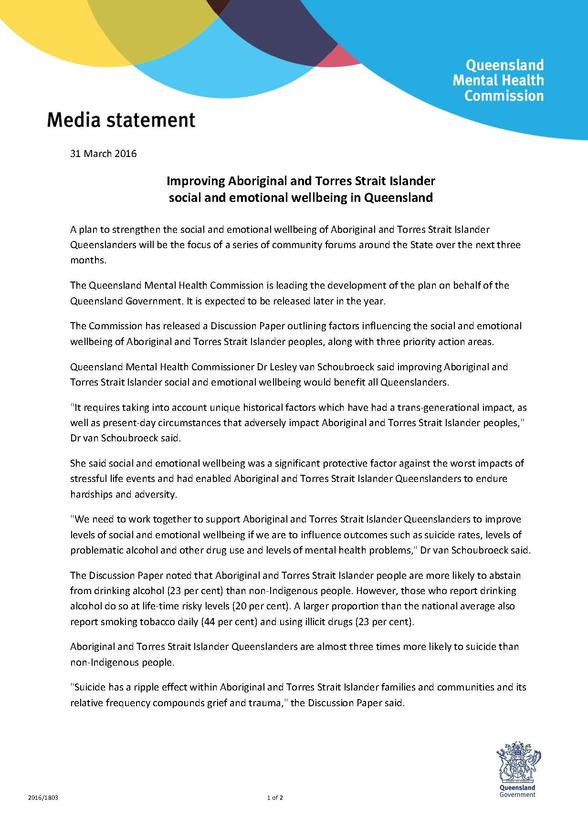A plan to strengthen the social and emotional wellbeing of Aboriginal and Torres Strait Islander Queenslanders will be the focus of a series of community forums around the State over the next three months.
The Queensland Mental Health Commission is leading the development of the plan on behalf of the Queensland Government. It is expected to be released later in the year.
The Commission has released a Discussion Paper outlining factors influencing the social and emotional wellbeing of Aboriginal and Torres Strait Islander peoples, along with three priority action areas.
Queensland Mental Health Commissioner Dr Lesley van Schoubroeck said improving Aboriginal and Torres Strait Islander social and emotional wellbeing would benefit all Queenslanders.
"It requires taking into account unique historical factors which have had a trans-generational impact, as well as present-day circumstances that adversely impact Aboriginal and Torres Strait Islander peoples," Dr van Schoubroeck said.
She said social and emotional wellbeing was a significant protective factor against the worst impacts of stressful life events and had enabled Aboriginal and Torres Strait Islander Queenslanders to endure hardships and adversity.
"We need to work together to support Aboriginal and Torres Strait Islander Queenslanders to improve levels of social and emotional wellbeing if we are to influence outcomes such as suicide rates, levels of problematic alcohol and other drug use and levels of mental health problems," Dr van Schoubroeck said.
The Discussion Paper noted that Aboriginal and Torres Strait Islander people are more likely to abstain from drinking alcohol (23 per cent) than non-Indigenous people. However, those who report drinking alcohol do so at life-time risky levels (20 per cent). A larger proportion than the national average also report smoking tobacco daily (44 per cent) and using illicit drugs (23 per cent).
Aboriginal and Torres Strait Islander Queenslanders are almost three times more likely to suicide than non-Indigenous people.
"Suicide has a ripple effect within Aboriginal and Torres Strait Islander families and communities and its relative frequency compounds grief and trauma," the Discussion Paper said.
Dr van Schoubroeck said the Action Plan, to be finalised following consultation on the Discussion Paper and the community forums, would build on the strength and resilience of Aboriginal and Torres Strait Islander peoples.
It proposes a series of initiatives in three priority areas:
- community participation
- family and community resilience
- individual social and emotional wellbeing.
The Discussion Paper noted that the impact of racism and discrimination on self-worth and self-esteem was a significant barrier to participating in the community and the economy. Accessing legal protections against discrimination was often hard.
"For example, being able to make a formal written complaint can be difficult for those who have limited access to resources and support," the Discussion Paper said.
The Discussion Paper outlines a number of actions already identified by other government and non-government agencies, along with new initiatives and performance measures to be considered in future.
Dr van Schoubroeck encouraged interested community members to provide feedback and comment on the Discussion Paper, available on the Commission’s website.
Consultation will also involve a series of community forums in the Torres Strait, Cairns, Townsville, Rockhampton, Mount Isa, Logan, Ipswich, Toowoomba and Brisbane between April and June 2016.
Dr van Schoubroeck said it was important to remember that all people experience differing levels of social and emotional wellbeing, regardless of whether they are living with a mental illness.
"Aboriginal and Torres Strait Islander peoples have known about the importance of social and emotional wellbeing for thousands of years," she said. "It is a part of their culture and spiritual beliefs, in the importance of family, community and in connections to the land and sea which continue to be a source of resilience and strength."

